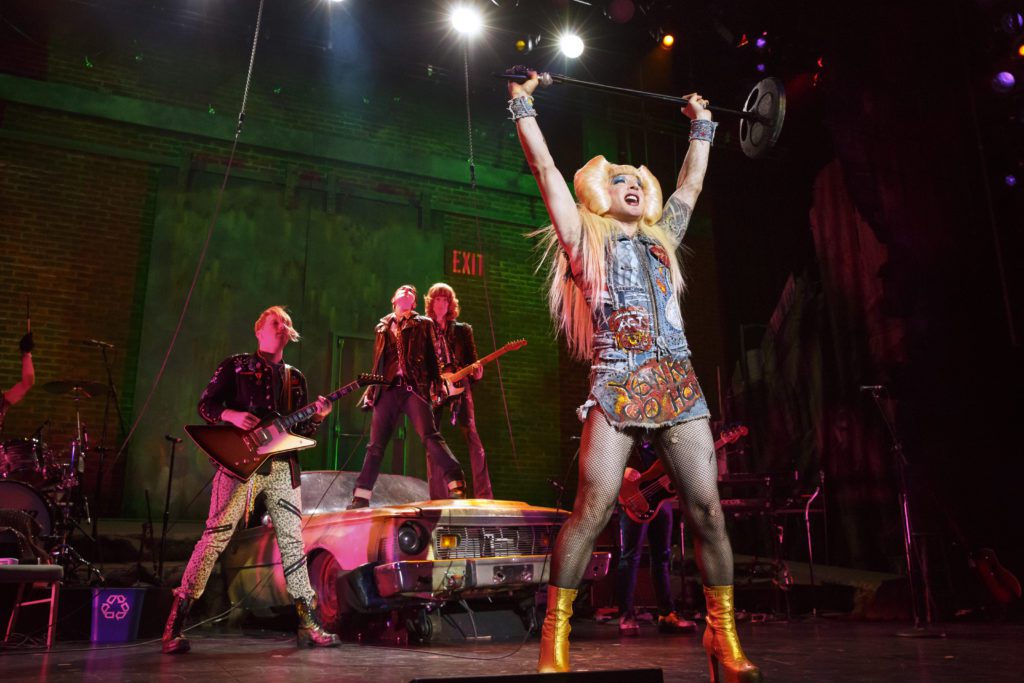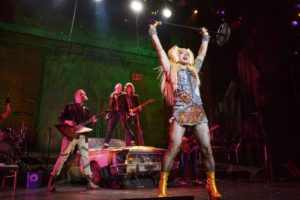‘Hedwig’ Comes to Washington
By • June 21, 2017 0 637


Hedwig and the Angry Inch Tour
Euan Morton
Hannah Corneau
The Kennedy Center’s musical summer or summer of musicals seems at once familiar — four smash musical hits — and a little dissonant.
The dissonance with the four road-show musicals — running in June, July and August — comes in the juxtapositions. Two-by-two sets of shows will be playing more or less concurrently at the Eisenhower Theater and the Opera House. On the surface, this seems like a matter of pragmatics (catch two shows back-to-back), a way of illustrating the richness and variety of the American musical theater or a puckish pairing of shows that stand in startling contrast to each other.
Hedwig of “Hedwig and the Angry Inch” and the Von Trapps? Sally Bowles and the King of Siam?
Two of the shows are of course presentations of American musicals by Richard Rodgers and Oscar Hammerstein, who together invented the serious, plot-driven, classic musical. “The Sound of Music,” the duo’s last big hit (which also became the ultimate movie-musical smash), and “The King and I” contain some of the essence of an R&H musical, including children, clashes and resounding, inspirational songs, staples of the Great American Songbook.
While R&H were revolutionary in their approach to the musical, Kander and Ebbs’ “Cabaret” and its remade, punkish version were a boots-and-makeup mile from the mostly wholesome R&H staples.
But it’s “Hedwig and the Angry Inch,” with a book by John Cameron Mitchell and lyrics and music by Stephen Trask, which — though it’s been around awhile in many incarnations as a revolutionary and edgy musical (Neil Patrick Harris starred on Broadway) — seems to bend closer to the time with each passing year.
The production opened in the Eisenhower Theater June 13 and runs through July 2.
It’s a flashy, loud, touching — and touched by David Bowie glam — rock-and-roll musical about a transgender (but also much more) rock star named Hedwig Robinson telling, singing, emoting, performing and laying out her life story, which begins in East Berlin and goes out into the world.
While there are other roles, including the imposing role of Yitzhak, it’s Hedwig that dominates the stage, the audience, the imagination; it’s an overpowering and exhausting role.
People had told Euan Morton — who stars in this touring company, taking over the role late last year — that he should have been doing this for a long time now. “I know, I know,” said Morton, in a Scottish accent. Back in 2002, Morton had a huge hit in the West End musical “Taboo” playing the gender-rich rock star Boy George, which got him a Olivier Award and Tony Award nomination.
“I thought, rock and roll, the makeup, the role, the costumes, lots of them, the wigs. I thought, maybe I shouldn’t,” continued the gifted, multi-talented, multi-faceted actor and singer, now 40, in a telephone interview. “But then, but then, my God, this is an actor’s, a performer’s dream. It’s such a challenge¸ how can you resist? And when I say that, I mean, how can you resist Hedwig? She always gets her way.”
It’s not like Morton hasn’t had his share of theatrical challenges and successes. His roles have included Ligniere in a version of “Cyrano de Bergerac” that he performed at the Richard Rodgers Theatre in 2007, followed by the huge musical revue “Sondheim on Sondheim” at Roundabout Theatre Company and Studio 54. On Broadway, he starred in the Tony Kushner adaptation of “Brundibar” and, well, now, “Caligula: An Ancient Glam Epic.”
He’s also very familiar to Washington audiences. He did a big hit turn in “Chess” at Signature Theatre, where he’s a favorite, and was in “Two Gentlemen of Verona” at the Shakespeare Theatre Company (“Yes, we had the dog,” he said of the show, which includes a dog in the cast at Queen Elizabeth’s request). Most memorable for this critic was his Helen Hayes Award-winning performance as Leo Frank in the Ford’s Theatre production of “Parade,” a difficult role for the rich-voiced Morton. “That really stretched the boundaries of what we expect out of musicals, in a different way than ‘Hedwig.’”
“Hedwig, well,” he said. “You know people always ask you what you bring to a role, what part does your life experience play, and we do that sometimes. But with Hedwig, well, you can’t. You come to rehearsal, you start the play and it’s her role. She takes over. It’s about her, not me. She leads you in a way, and it’s always startling, different and always human. I bring my talent, she brings herself and the life.
“People have expectations, I know. But what I learned from this is not to have them, to let yourself be surprised,” he said. “We — I — do what you might call an audience intervention, to interact with an audience member, and it’s always a little different. But one night in Denver, I came upon this man, and I think he was in his 90s, and I thought, ‘Oh boy, this is going to be something.’ But the man, his whole face lit up in warmth, he beamed. And so you never know.”
There’s something essential about Morton. He’s got a warm, easy voice that he can stretch out like a desperate beggar, a terrific sense of humor, a built-in curiosity. His wife, producer Lee Armitage, is the daughter of George W. Bush-era Deputy Secretary of State Richard L. Armitage. His son, Iain, is a fledging internet theater critic. They live in Arlington, Virginia, and New York.
“Hedwig is essentially about what it’s like to be human,” he said. “That’s what happens every day and night no matter where we are. And here we are in Washington, a long time since the show first began in 1997, in a changed world.”

